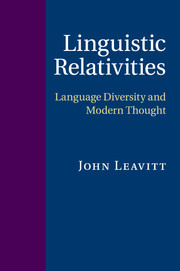Book contents
- Frontmatter
- Contents
- Preface
- Introduction
- 1 A passage to modernity
- 2 One reason, one world, many monads
- 3 The world at war with reason: Britain and France in the eighteenth century
- 4 Multiplicity and the Romantic explosion
- 5 Essences and universals through the nineteenth century
- 6 Boas and the linguistic multiverse
- 7 Linguistic relativity: Sapir, Lee, and Whorf
- 8 The other side of the mirror: a twentieth-century essentialism
- 9 The rise of cognition and the repression of languages
- 10 The return of the repressed
- Conclusion
- Notes
- References
- Index
Introduction
Published online by Cambridge University Press: 04 April 2011
- Frontmatter
- Contents
- Preface
- Introduction
- 1 A passage to modernity
- 2 One reason, one world, many monads
- 3 The world at war with reason: Britain and France in the eighteenth century
- 4 Multiplicity and the Romantic explosion
- 5 Essences and universals through the nineteenth century
- 6 Boas and the linguistic multiverse
- 7 Linguistic relativity: Sapir, Lee, and Whorf
- 8 The other side of the mirror: a twentieth-century essentialism
- 9 The rise of cognition and the repression of languages
- 10 The return of the repressed
- Conclusion
- Notes
- References
- Index
Summary
Many languages
Human beings form a single species but speak thousands of different languages. Each differs from the others in its sounds, in the words it offers and what they stand for, in how words are built and how they are put together to make sentences. Speaking any language requires mastery of complex practices that take place simultaneously on many levels: a sophisticated choreography of mouth and throat to produce a distinctive set of sounds; an ear that has learned to recognize these particular distinctions; control of some tens of thousands of signs and their meanings, meanings that will be different in their boundaries and often in their centers from those of the signs of any other language; constant manipulation of pervasive grammatical categories that foreground some aspects of experience rather than others. Every one of these practices is carried out either unconsciously or with only the most limited conscious involvement. And every one of them is performed hundreds or thousands of times a day by every speaker and hearer of a given language in a way that is unique to that language.
How much does all of this matter? Does the language spoken affect other aspects of life? Does it affect one's way of thinking, of feeling, of perceiving or constructing the world? These questions have arisen in some form in most periods of history, in most civilizations.
- Type
- Chapter
- Information
- Linguistic RelativitiesLanguage Diversity and Modern Thought, pp. 1 - 15Publisher: Cambridge University PressPrint publication year: 2010



